State-backed assets from Singapore have ended up on an ESG blacklist at Van Lanschot Kempen NV, after Asia’s wealthiest country per capita failed an updated ESG test used by the wealth manager to screen for environmental risks.
Kempen, which oversees about $130 billion of client assets from its base in the Netherlands, started applying its test to sovereign bonds and state-backed entities last year. The results mostly feed through to portfolio allocations for pension clients, but can also affect other customer groups, said Nikesh Patel, senior executive at the firm.
“We can implement this across segregated accounts or separately managed accounts, and we do intend to apply our country policy across other managers and asset classes,” Patel said in an interview. “Government debt — and emerging-market government debt — is the largest concentration of exposure, and therefore our first area of focus.”
The decision marks a rare example of a developed economy falling out of favor with investors focused on environmental, social and governance scores. Kempen’s other exclusions affect assets from Russia, China and Saudi Arabia.
“Unfortunately the direction of travel in both biodiversity and climate is in reverse” in Singapore, Patel said. “They’re not seeing the same kind of positive improvements we expect from quite advanced economies, but even other regional economies that aren’t necessarily advanced.”
The exclusion hasn’t resulted in major divestments, as the asset manager’s exposure to Singapore state-affiliated securities was “negligible,” Patel said.
In a written comment, a spokesperson for Singapore’s Ministry of Sustainability and the Environment said “we do not have any information and hence, we are unable to comment on this.”
It’s not the first time a rich nation has been affected by an ESG blacklist. The German state of Baden-Württemberg, one of the wealthiest regions in Europe’s biggest economy, adopted a law this year that puts investing sustainably on par with more traditional criteria such as profitability and liquidity. The decision resulted in US Treasuries ending up on an investing blacklist, due to America’s failure to ratify a number of treaties in areas including women’s rights and controversial weapons. Other nations to be singled out by the policy include Finland, Latvia and Greece.
Singapore is falling behind due to its inefficient use of energy to protect the population from tropical heat, Kempen’s Patel said.
“It’s a very advanced economy in a place where it’s the norm to have air-conditioned everything,” he said. “That’s not a choice that they’re making because they don’t care. It’s because from a society perspective it’s so hot there they’ve got used to walking from one end of the city to the other and not having to breathe natural air.”
Singapore is often held up as an economic success story and boasts a AAA credit grade from the major ratings agencies, a coveted status that the US and the UK haven’t been able to maintain. Singapore’s government has committed to net zero emissions by 2050.
But an analysis by BloombergNEF indicates that Singapore’s reliance on renewables for its electricity fell to 2.68% in 2021 from 4.08% five years ago. BNEF also estimates the country has weaker power transition policies than its peers. By comparison, Germany gets more than 40% of its electricity from renewables and the US gets about 20%.
Singapore’s small landmass — the island is less than half as big as London — has left it with limited options when it comes to building renewable energy infrastructure. As a result, it relies heavily on imports from neighboring countries.
The country “faces very unique circumstances for its energy transition,” said Caroline Chua, a Singapore-based analyst at BNEF. Because it’s “land-scarce and resource-constrained,” the country has “a limited amount” of renewable power generation capacity that it can build domestically, she said.
Singapore has been “trying to harness all available space for solar installation, including water surfaces and temporarily vacant land,” Chua said. As a result, the nation’s so-called generation share of solar has grown over the past six years, but more than 90% of Singapore’s electricity still comes from natural gas, she said.
At the same time, Singapore is emerging as a hub for green finance in Asia, and regulators in the country are stepping up efforts to fight greenwashing. In April, Singapore’s central bank proposed a slate of measures that will affect financial firms and publicly traded companies as it seeks to align the island’s ESG rules with international standards.
Patel said Kempen’s ESG policy toward sovereigns doesn’t include the kinds of engagement strategies that are common with corporates, where shareholders use their clout as owners to pressure management to push through changes.
“It’s very hard to imagine that we as an investor — or any investor — can feasibly convince Russia or China or Brazil, or any of those countries, to do something different to what they already wanted to do,” he said. “So we’re focusing on state-owned and government and direct financing” and “our view is if you’re going to do this, it can’t be tilting. You either include them or exclude them.”
--With assistance from Sheryl Tian Tong Lee.
(Adds reference to US Treasuries being blacklisted by German state, beneath Read-More box.)

